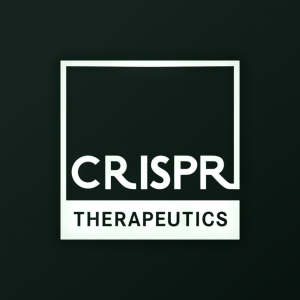CRISPR Therapeutics Provides Business Update and Reports Fourth Quarter and Full Year 2023 Financial Results
— CASGEVY™ approved in the U.S., European Union, Great Britain, the Kingdom of Saudi Arabia and Bahrain —
— Clinical trials ongoing for next generation CAR T product candidates, CTX112™ and CTX131™ targeting CD19 and CD70, respectively —
— Clinical trials ongoing for in vivo gene editing product candidates, CTX310™ and CTX320™ targeting ANGPTL3 and Lp(a), respectively —
— Clinical trial ongoing for CTX211™, an allogeneic, hypoimmune, gene-edited, stem cell derived product candidate for the treatment of Type 1 Diabetes (T1D) —
— Strengthened balance sheet with
ZUG, Switzerland and BOSTON, Feb. 21, 2024 (GLOBE NEWSWIRE) -- CRISPR Therapeutics (Nasdaq: CRSP), a biopharmaceutical company focused on creating transformative gene-based medicines for serious diseases, today reported financial results for the fourth quarter and full year ended December 31, 2023.
“2023 was a monumental year for CRISPR Therapeutics, with multiple milestones achieved across our pipeline, including the first-ever approval of a CRISPR-based gene-editing therapy in addition to entering the clinic with our first in vivo programs targeting cardiovascular diseases,” said Samarth Kulkarni, Ph.D., Chairman and Chief Executive Officer of CRISPR Therapeutics. “We continue to advance our next generation CAR T cell programs, CTX112 and CTX131, which have the potential to be best-in-class cell therapies for the treatment of both liquid and solid tumors. Additionally, we plan to initiate a clinical trial of CTX112 in systemic lupus erythematosus (SLE) in the first half of 2024, with the potential to expand into additional autoimmune indications in the future. We are excited about our first two in vivo programs that are now in the clinic, and also expect to nominate additional in vivo programs targeting both rare and common diseases mid-year. I am incredibly excited about the year ahead as we continue to innovate across our platform and execute on our clinical trials across various therapeutic areas, including oncology, autoimmune, cardiovascular and diabetes, setting up a catalyst-rich 12-18 months for the company.”
Recent Highlights and Outlook
- Hemoglobinopathies and CASGEVY™ (exagamglogene autotemcel [exa-cel])
- CASGEVY has been approved in the U.S., E.U., Great Britain, Bahrain, and the Kingdom of Saudi Arabia (KSA) for the treatment of patients with either sickle cell disease (SCD) or transfusion-dependent beta thalassemia (TDT). Nearly 35,000 patients are living with severe SCD or TDT in the U.S. and Europe alone. CASGEVY is the first therapy to emerge from a strategic partnership between CRISPR Therapeutics and Vertex Pharmaceuticals established in 2015. As part of an amendment to the collaboration agreement in 2021, Vertex now leads global development, manufacturing, regulatory and commercialization of CASGEVY with support from CRISPR Therapeutics.
- The regulatory submission for CASGEVY for both SCD and TDT is currently under review in Switzerland, with submission in Canada planned for the first half of 2024.
- Vertex reported progress on CASGEVY launch in the U.S. with the activation of 12 authorized treatment centers (ATCs) in the U.S. and the signing of an agreement with Synergie Medication Collective, a contracting organization which supports payors covering approximately 100 million people in the U.S., to provide access to CASGEVY. Additionally, Vertex is actively engaging with state Medicaid organizations to secure immediate reimbursement and coverage for CASGEVY.
- Outside the U.S., Vertex reported progress on the launch with the activation of three authorized treatment centers in the E.U. and one in KSA. Additionally, the French National Authority for Health (HAS) approved a request for the implementation of an early access program (EAP) for the use of CASGEVY to treat eligible people with TDT. Vertex is also pursuing an EAP submission for SCD in France and expects to hear the outcome of this decision in the coming months.
- CRISPR Therapeutics has two next-generation approaches that each have the potential to expand the addressable population with SCD and TDT significantly. CRISPR Therapeutics continues to advance its internally developed targeted conditioning program, an anti-CD117 (c-Kit) antibody-drug conjugate (ADC), through preclinical studies. Additionally, CRISPR Therapeutics has ongoing research efforts to enable in vivo editing of hematopoietic stem cells. This work, supported in part by a
$14.5 million grant from the Bill & Melinda Gates Foundation, could obviate the need for conditioning altogether, expand geographic reach, and enable the treatment of multiple additional other diseases beyond SCD and TDT.
- Immuno-Oncology and Autoimmune Disease
- CRISPR Therapeutics’ next-generation allogeneic CAR T candidates reflect the Company’s mission of innovating continuously to bring potentially transformative medicines to patients as quickly as possible. Clinical trials are ongoing for CRISPR Therapeutics’ next-generation CAR T product candidates, CTX112™ and CTX131™, targeting CD19 and CD70, respectively. Emerging pharmacology data, including pharmacokinetics, indicate that the novel potency gene edits in CTX112 and CTX131 can lead to significantly higher CAR T cell expansion and functional persistence in patients compared to the first-generation candidates. Focusing efforts on these candidates will enable the Company to advance these potentially best-in-class CAR T therapies more efficiently and rapidly. The Company expects to provide a clinical update in 2024 for these next-generation candidates.
- CRISPR Therapeutics plans to initiate a clinical trial of CTX112 in systemic lupus erythematosus (SLE) in the first half of 2024, with the potential to expand into additional autoimmune indications in the future. Early clinical studies have shown that CD19-directed autologous CAR T therapy can produce long-lasting remissions in multiple autoimmune indications by deeply depleting B cells. The Company’s first generation allogeneic CD19-directed CAR T program has demonstrated that allogeneic CAR T cells can effectively deplete B cells in clinical trials in oncology settings, which supports the potential of CTX112 in autoimmune diseases.
- CRISPR Therapeutics is on track to initiate a Phase 1 trial of CTX131 in hematologic malignancies, including T- and B-cell malignancies, in the first half of 2024. CTX131 is currently in an ongoing clinical trial in solid tumors.
- In Vivo
- CRISPR Therapeutics continues to advance a pipeline of in vivo gene editing programs using lipid nanoparticle (LNP) delivery of Cas9 mRNA and a guide RNA (gRNA) to the liver. Its first two in vivo programs, CTX310™ and CTX320™, each aim to reduce expression of a validated target for cardiovascular disease. Beginning with these programs, CRISPR Therapeutics aims to transform the treatment paradigm for cardiovascular indications and beyond with potential one-time therapies that could recapitulate the proven benefit of targets validated by natural human genetics and other therapeutic modalities.
- A Phase 1 clinical trial is ongoing for CTX310, targeting angiopoietin-like 3 protein (ANGPTL3). In humans, naturally occurring loss-of-function variants of the ANGPTL3 gene are associated with reduced levels of serum lipids and reduced risk of atherosclerotic cardiovascular disease. The Phase 1 trial is open to patients with mixed dyslipidemias, homozygous familial hypercholesterolemia, heterozygous familial hypercholesterolemia, and severe hypertriglyceridemia.
- A Phase 1 clinical trial is ongoing for CTX320, targeting lipoprotein(a) (Lp(a)). Elevated Lp(a), which is associated with an increased risk of atherosclerotic cardiovascular disease, is present in approximately one in five people in the United States and around the world.
- CRISPR Therapeutics expects to nominate additional in vivo programs targeting both rare and common diseases this year, to be disclosed in mid-2024.
- Regenerative Medicine
- CRISPR Therapeutics continues to advance a Phase 1 clinical trial for CTX211™ for the treatment of Type 1 Diabetes (T1D). CRISPR Therapeutics remains committed to its goal of developing a beta-cell replacement product that does not require chronic immunosuppression.
- Vertex has non-exclusive rights to certain CRISPR Therapeutics’ CRISPR/Cas9 technology to accelerate development of potentially curative cell therapies for T1D. Vertex paid
$170 million to CRISPR Therapeutics in upfront and milestone payments in 2023 as part of that licensing agreement, and CRISPR Therapeutics remains eligible for an additional$160 million in research and development milestones and would receive royalties on any future products resulting from this agreement.
- Other Corporate Matters
- In February 2024, CRISPR Therapeutics announced that it has entered into an investment agreement for the sale of approximately
$280 million of its common shares to a select group of institutional investors in a registered direct offering, at a price per share of$71.50 , representing a premium of greater than10% to CRISPR Therapeutics’ 30-day volume-weighted average price. The financing is expected to close on or about February 27, 2024, subject to customary closing conditions.
- In February 2024, CRISPR Therapeutics announced that it has entered into an investment agreement for the sale of approximately
Fourth Quarter and Full Year 2023 Financial Results
- Cash Position: Cash, cash equivalents, and marketable securities were
$1,695.7 million as of December 31, 2023, compared to$1,868.4 million as of December 31, 2022. The decrease in cash of$172.7 million was primarily driven by operating expenses, offset by payments received from Vertex in connection with a non-exclusive license agreement and related milestone, as well as interest income. Pro-forma cash, cash equivalents, and marketable securities were greater than$2.1 billion as of February 21, 2024, inclusive of a$200 million milestone received in January 2024 for the approval of CASGEVY and approximately$280 million in proceeds from the February 2024 registered direct offering. - R&D Expenses: R&D expenses were
$95.1 million for the fourth quarter of 2023, compared to$103.6 million for the fourth quarter of 2022. The decrease in R&D expense was primarily driven by reduced variable external research and manufacturing costs. - G&A Expenses: General and administrative expenses were
$16.5 million for the fourth quarter of 2023, compared to$21.2 million for the fourth quarter of 2022. The decrease in G&A expense was primarily driven by a decrease in external professional costs. - Collaboration Expense: Collaboration expense, net, was
$20.0 million for the fourth quarter of 2023, compared to$6.8 million for the fourth quarter of 2022. The increase of approximately$13.2 million in collaboration expense, net, was primarily driven by an additional$20 million licensing fee owed to Vertex in connection with the Amended and Restated Joint Development and Collaboration Agreement, offset by the fact that we reached the$110.3 million deferral limit on costs related to the CASGEVY program in the third quarter of 2023, whereas the limit was not reached until the fourth quarter of 2022. - Net Income (Loss): Net income was
$89.3 million for the fourth quarter of 2023, compared to a net loss of$110.6 million for the fourth quarter of 2022.
About CASGEVY™ (exagamglogene autotemcel [exa-cel])
CASGEVY™ is a non-viral, ex vivo CRISPR/Cas9 gene-edited cell therapy for eligible patients with SCD or TDT, in which a patient’s own hematopoietic stem and progenitor cells are edited at the erythroid specific enhancer region of the BCL11A gene through a precise double-strand break. This edit results in the production of high levels of fetal hemoglobin (HbF; hemoglobin F) in red blood cells. HbF is the form of the oxygen-carrying hemoglobin that is naturally present during fetal development, which then switches to the adult form of hemoglobin after birth. CASGEVY has been shown to reduce or eliminate VOCs for patients with SCD and transfusion requirements for patients with TDT.
CASGEVY is approved for certain indications in multiple jurisdictions for eligible patients.
About the CRISPR Collaboration and Vertex
CRISPR Therapeutics and Vertex entered into a strategic research collaboration in 2015 focused on the use of CRISPR/Cas9 to discover and develop potential new treatments aimed at the underlying genetic causes of human disease. CASGEVY (exa-cel) represents the first potential treatment to emerge from the joint research program. Under an amended collaboration agreement, Vertex now leads global development, manufacturing, and commercialization of CASGEVY and splits program costs and profits worldwide 60/40 with CRISPR Therapeutics. Vertex is the manufacturer and exclusive license holder of CASGEVY™.
About CTX112
CTX112 is a next-generation, wholly-owned, allogeneic CAR T product candidate targeting Cluster of Differentiation 19, or CD19, which incorporates additional edits designed to enhance CAR T potency and reduce CAR T exhaustion. CTX112 is being investigated in an ongoing clinical trial designed to assess safety and efficacy of the product candidate in adult patients with relapsed or refractory CD19-positive B-cell malignancies who have received at least two prior lines of therapy.
About CTX131
CTX131 is a next-generation, wholly-owned, allogeneic CAR T product candidate targeting Cluster of Differentiation 70, or CD70, an antigen expressed on various solid tumors and hematologic malignancies. CTX131 incorporates additional edits designed to enhance CAR T potency and reduce CAR T exhaustion. CTX131 is being investigated in a clinical trial designed to assess the safety and efficacy of the product candidate in adult patients with relapsed or refractory solid tumors.
About in vivo
Our lead investigational in vivo programs, CTX310 and CTX320, target angiopoietin-related protein 3 (ANGPTL3) and lipoprotein(a) (Lp(a)), respectively, two validated targets for cardiovascular disease, and we have initiated a Phase 1 clinical trial for both.
About CTX211
CTX211 is an allogeneic, gene-edited, stem cell-derived investigational therapy for the treatment of T1D, which incorporates gene edits that aim to make cells hypoimmune and enhance cell fitness. This immune-evasive cell replacement therapy is designed to enable patients to produce their own insulin in response to glucose.
About CRISPR Therapeutics
Since its inception over a decade ago, CRISPR Therapeutics has transformed from a research-stage company advancing programs in the field of gene editing, to a company with a diverse portfolio of product candidates across a broad range of disease areas including hemoglobinopathies, oncology, regenerative medicine, cardiovascular and rare diseases. The Nobel Prize-winning CRISPR science has revolutionized biomedical research and represents a powerful, clinically validated approach with the potential to create a new class of potentially transformative medicines. To accelerate and expand its efforts, CRISPR Therapeutics has established strategic partnerships with leading companies including Bayer and Vertex Pharmaceuticals. CRISPR Therapeutics AG is headquartered in Zug, Switzerland, with its wholly-owned U.S. subsidiary, CRISPR Therapeutics, Inc., and R&D operations based in Boston, Massachusetts and San Francisco, California, and business offices in London, United Kingdom. To learn more, visit www.crisprtx.com.
CRISPR THERAPEUTICS® standard character mark and design logo, CTX112™, CTX131™, CTX310™, CTX320™, CTX211™ and VCTX211™ are trademarks and registered trademarks of CRISPR Therapeutics AG. The CASGEVY™ word mark and design are trademarks of Vertex Pharmaceuticals Incorporated. All other trademarks and registered trademarks are the property of their respective owners.
CRISPR Therapeutics Forward-Looking Statement
This press release may contain a number of “forward-looking statements” within the meaning of the Private Securities Litigation Reform Act of 1995, as amended, including statements made by Dr. Kulkarni in this press release, as well as statements regarding CRISPR Therapeutics’ expectations about any or all of the following: (i) its plans for and its preclinical studies, clinical trials and pipeline products and programs, including, without limitation, manufacturing capabilities, status of such studies and trials, potential expansion into new indications and expectations regarding data generally; (ii) the data that will be generated by ongoing and planned clinical trials, and the ability to use that data for the design and initiation of further clinical trials; (iii) plans and expectations for the commercialization of, and anticipated benefits of, CASGEVY, including the anticipated patient populations eligible for CASGEVY in jurisdictions where it has been or may be approved; (iv) the sufficiency of its cash resources; (v) the expected benefits of its collaborations; and (vi) the therapeutic value, development, and commercial potential of CRISPR/Cas9 gene editing technologies and therapies. Without limiting the foregoing, the words “believes,” “anticipates,” “plans,” “expects” and similar expressions are intended to identify forward-looking statements. You are cautioned that forward-looking statements are inherently uncertain. Although CRISPR Therapeutics believes that such statements are based on reasonable assumptions within the bounds of its knowledge of its business and operations, forward-looking statements are neither promises nor guarantees and they are necessarily subject to a high degree of uncertainty and risk. Actual performance and results may differ materially from those projected or suggested in the forward-looking statements due to various risks and uncertainties. These risks and uncertainties include, among others: the efficacy and safety results from ongoing clinical trials will not continue or be repeated in ongoing or planned clinical trials or may not support regulatory submissions; regulatory authorities may not approve exa-cel on a timely basis or at all; adequate pricing or reimbursement may not be secured to support continued development or commercialization of exa-cel following regulatory approval; clinical trial results may not be favorable; one or more of its product candidate programs will not proceed as planned for technical, scientific or commercial reasons; future competitive or other market factors may adversely affect the commercial potential for its product candidates; initiation and completion of preclinical studies for its product candidates is uncertain and results from such studies may not be predictive of future results of future studies or clinical trials; regulatory approvals to conduct trials or to market products are uncertain; uncertainties inherent in the operation of a manufacturing facility; it may not realize the potential benefits of its collaborations; uncertainties regarding the intellectual property protection for its technology and intellectual property belonging to third parties, and the outcome of proceedings (such as an interference, an opposition or a similar proceeding) involving all or any portion of such intellectual property; and those risks and uncertainties described under the heading "Risk Factors" in CRISPR Therapeutics’ most recent annual report on Form 10-K, quarterly report on Form 10-Q and in any other subsequent filings made by CRISPR Therapeutics with the U.S. Securities and Exchange Commission, which are available on the SEC's website at www.sec.gov. Existing and prospective investors are cautioned not to place undue reliance on these forward-looking statements, which speak only as of the date they are made. CRISPR Therapeutics disclaims any obligation or undertaking to update or revise any forward-looking statements contained in this press release, other than to the extent required by law.
Investor Contact:
Susan Kim
+1-617-307-7503
susan.kim@crisprtx.com
Media Contact:
Rachel Eides
+1-617-315-4493
rachel.eides@crisprtx.com
| CRISPR Therapeutics AG Condensed Consolidated Statements of Operations (Unaudited, In thousands except share data and per share data) | ||||||||||||||||
| Three Months Ended December 31, | Twelve Months Ended December 31, | |||||||||||||||
| 2023 | 2022 | 2023 | 2022 | |||||||||||||
| Revenue: | ||||||||||||||||
| Collaboration revenue | $ | 200,000 | $ | 6 | $ | 370,000 | $ | 436 | ||||||||
| Grant revenue | 1,206 | — | 1,206 | 762 | ||||||||||||
| Total revenue | 201,206 | $ | 6 | $ | 371,206 | $ | 1,198 | |||||||||
| Operating expenses: | ||||||||||||||||
| Research and development | 95,144 | 103,555 | 387,332 | 461,645 | ||||||||||||
| General and administrative | 16,479 | 21,169 | 76,162 | 102,464 | ||||||||||||
| Collaboration expense, net | 20,000 | 6,823 | 130,250 | 110,250 | ||||||||||||
| Total operating expenses | 131,623 | 131,547 | 593,744 | 674,359 | ||||||||||||
| Income (loss) from operations | 69,583 | (131,541 | ) | (222,538 | ) | (673,161 | ) | |||||||||
| Total other income, net | 19,997 | 11,490 | 71,816 | 22,661 | ||||||||||||
| Net income (loss) before income taxes | 89,580 | (120,051 | ) | (150,722 | ) | (650,500 | ) | |||||||||
| (Provision) benefit for income taxes | (233 | ) | 9,476 | (2,888 | ) | 325 | ||||||||||
| Net income (loss) | 89,347 | (110,575 | ) | (153,610 | ) | (650,175 | ) | |||||||||
| Foreign currency translation adjustment | 61 | 115 | 73 | (80 | ) | |||||||||||
| Unrealized gain (loss) on marketable securities | 8,649 | 6,501 | 17,487 | (10,500 | ) | |||||||||||
| Comprehensive income (loss) | $ | 98,057 | $ | (103,959 | ) | $ | (136,050 | ) | $ | (660,755 | ) | |||||
| Net income (loss) per common share — basic | $ | 1.12 | $ | (1.41 | ) | $ | (1.94 | ) | $ | (8.36 | ) | |||||
| Basic weighted-average common shares outstanding | 79,688,337 | 78,336,506 | 79,220,930 | 77,746,575 | ||||||||||||
| Net income (loss) per common share — diluted | $ | 1.10 | $ | (1.41 | ) | $ | (1.94 | ) | $ | (8.36 | ) | |||||
| Diluted weighted-average common shares outstanding | 81,324,786 | 78,336,506 | 79,220,930 | 77,746,575 | ||||||||||||
| CRISPR Therapeutics AG Condensed Consolidated Balance Sheets Data (Unaudited, in thousands) | ||||||||
| As of | ||||||||
| December 31, 2023 | December 31, 2022 | |||||||
| Cash and cash equivalents | $ | 389,477 | $ | 211,885 | ||||
| Marketable securities | 1,304,215 | 1,603,433 | ||||||
| Marketable securities, non-current | 1,973 | 53,130 | ||||||
| Working capital | 1,799,287 | 1,731,919 | ||||||
| Total assets | 2,229,571 | 2,243,057 | ||||||
| Total shareholders' equity | 1,882,803 | 1,875,479 | ||||||







